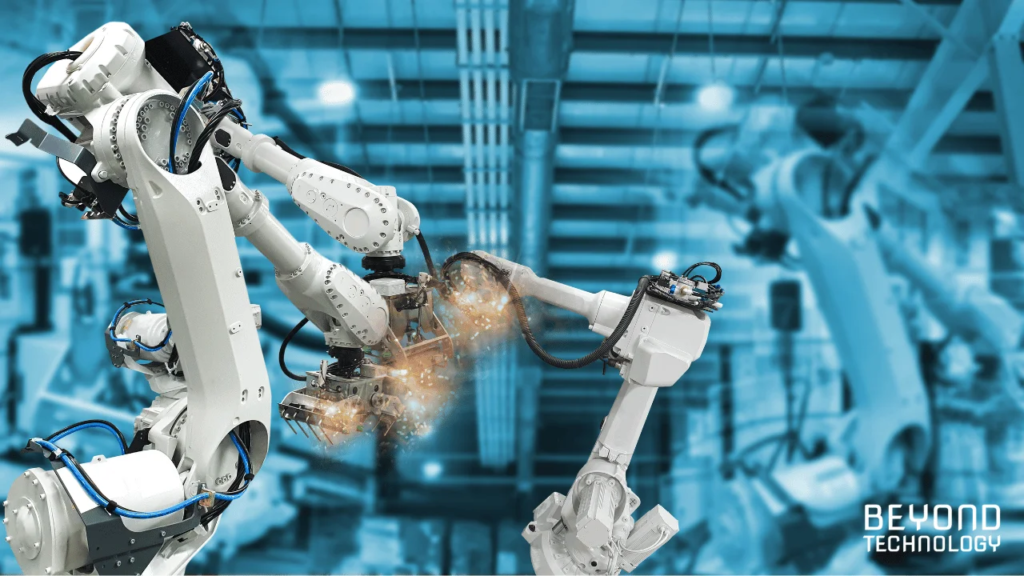
In this 4.0 Industrial era, industrial robotics has emerged as one of the most transformative technologies for manufacturing and production. The integration of robots into production lines has not only improved efficiency and precision but also enabled greater flexibility and adaptability to changing market demands. In this article, we will explore how industrial robotics is revolutionizing production, highlighting its benefits, applications, and the promising future of this technology.
The Evolution of Industrial Robotics
Industrial robotics is not a new concept; its development dates back to the 1960s with the creation of the first industrial robots like the Unimate. These early robots were simple and primarily used for repetitive and dangerous tasks in industrial environments. However, advancements in technology, especially in artificial intelligence, sensors, and control systems, have allowed modern robots to be much more sophisticated and capable of performing a wide variety of tasks with greater autonomy and precision.
Benefits of Industrial Robotics
1. Efficiency and Precision
One of the main benefits of industrial robotics is the significant improvement in the efficiency and precision of operations. Robots can work at speeds higher than humans and maintain consistent precision, reducing the margin of error and improving the quality of the final product. This is especially critical in industries such as automotive and electronics, where even the smallest error can result in significant costs.
2. Production Flexibility
Industrial robotics allows for greater flexibility in production lines. With the ability to be reprogrammed and adapted to different tasks, robots can quickly switch between the production of different products without the need for major modifications in infrastructure. This flexibility is essential in a global market where consumer demand can change rapidly and product customization is increasingly common.
3. Cost Reduction
Although the initial investment in industrial robotics can be significant, long-term costs tend to decrease. Automation reduces the need for labor for repetitive and dangerous tasks, thereby lowering labor costs and the risks associated with worker health and safety. Additionally, improved efficiency and reduced errors contribute to lower production costs and waste.
4. Improved Workplace Safety
The implementation of robots in industrial environments has significantly improved workplace safety. Robots can perform dangerous tasks that previously put human workers’ lives and health at risk. By taking on these tasks, robots allow workers to focus on safer and higher-value activities.
Applications of Industrial Robotics
Industrial robotics has a wide range of applications across various industries. Below are some of the most common applications:
1. Automotive Industry
The automotive industry has been one of the main beneficiaries of industrial robotics. Robots are used in vehicle manufacturing for tasks such as welding, painting, assembly, and material handling. The precision and speed of robots have enabled the mass production of automobiles with superior quality and consistency.
2. Electronics
In the electronics industry, robots are essential for the manufacturing of devices such as smartphones, computers, and televisions. Robots perform assembly and testing tasks with a precision that would be impossible to achieve manually, ensuring high-quality products.
3. Logistics and Warehousing
Robots also play a crucial role in logistics and warehousing. Automated storage and retrieval systems (AS/RS) use robots to move products in and out of storage, improving efficiency and reducing errors. Additionally, autonomous mobile robots (AMR) are used to transport goods within warehouses, optimizing workflow and reducing wait times.
4. Food and Beverage
In the food and beverage industry, robots are used for tasks such as packaging, labeling, and palletizing. The precision and consistency offered by robots are essential for meeting quality and food safety standards.
Industrial robotics is transforming production by offering greater efficiency, precision, and flexibility. Technological advancements continue to expand the capabilities of robots, allowing companies to respond more agilely to market demands and improve their production processes. With the integration of artificial intelligence, IoT, and collaborative robotics, the future of industrial robotics promises to be even more innovative and disruptive.
Companies that adopt industrial robotics will be better positioned to compete in an increasingly demanding and dynamic global market. Automation and flexible production not only improve productivity but also ensure quality and safety, creating a more efficient and sustainable work environment.
In summary, industrial robotics is a key piece in the puzzle of modern manufacturing and will continue to be a fundamental driver of innovation and industrial transformation in the coming years.
